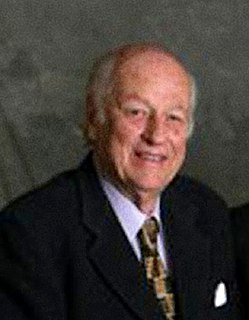A Quote by Helen Keller
No loss by flood and lightning, no destruction of cities and temples by the hostile forces of nature, has deprived man of so many noble lives and impulses as those which his intolerance has destroyed.
Related Quotes
We must not only protect the country side and save it from destruction, we must restore what has been destroyed and salvage the beauty and charm of our cities ... Once our natural splendor is destroyed, it can never be recaptured. And once man can no longer walk with beauty or wonder at nature, his spirit will wither and his sustenance be wasted.
Modern man lives isolated in his artificial environment, not because the artificial is evil as such, but because of his lack of comprehension of the forces which make it work- of the principles which relate his gadgets to the forces of nature, to the universal order. It is not central heating which makes his existence 'unnatural,' but his refusal to take an interest in the principles behind it. By being entirely dependent on science, yet closing his mind to it, he leads the life of an urban barbarian.
How are the faculties of man to be best developed and his happiness secured? The state of a king is not favorable to this, nor the state of the noble and rich men of the earth. All this is artificial life, the inventions of vanity and grasping ambition, by which we have spoiled the man of nature and of pure, simple, and undistorted impulses.
Animation had been used only for things like King Kong and the destruction of cities, which was very popular in the 1950s. I got tired of destroying cities. I destroyed New York, I destroyed San Francisco's Golden Gate Bridge, Rome, and Washington. I was looking for a new outlet, and I came across the Sinbad legends.
I think when you see so many Hindu temples of the 10th century or earlier disfigured, defaced, you realise that something terrible happened. I feel the civilisation of that closed world was mortally wounded by those invasions the old world is destroyed. That has to be understood. Ancient Hindu India was destroyed.
If a man loses a dear friend, he looks around and sees many friends come to console and comfort him. If a man loses his wealth, after a little thought he will realize that the delight that came from wealth will be restored by finding more. Thus he forgets his loss and is consoled. But if a man's heart is deprived of peace, where will he find it again, how will he replace it?
Again, if the world is destroyed, it must needs either be destroyed according to nature or against nature. Against nature is impossible, for that which is against nature is not stronger than nature. If according to nature, there must be another nature which changes the nature of the world: which does not appear.
Nature has placed in the front part of man, as he moves, all those parts which when struck cause him to feel pain; and this is felt in the joints of the legs, the forehead and the nose, and has been so devised for the preservation of man, because if such pain were not felt in these limbs they would be destroyed by the many blows they receive.
I know no study which is so unutterably saddening as that of the evolution of humanity, as it is set forth in the annals of history. Out of the darkness of prehistoric ages man emerges with the marks of his lowly origin strong upon him. He is a brute, only more intelligent than the other brutes, a blind prey to impulses, which as often as not led him to destruction; a victim to endless illusions, which make his mental existence a terror and a burden, and fill his physical life with barren toil and battle.
When one speaks of humanity, the idea is fundamental that this is something which separates and distinguishes man from nature. In reality, however, there is no such separation: "natural" qualities and those called truly "human" are inseparably grown together. Man, in his highest and noblest capacities, is wholly nature and embodies its uncanny dual character. Those of his abilities which are terrifying and considered inhuman may even be the fertile soil out of which alone all humanity can grow in impulse, deed, and work.
Nature is man's inorganic body -- that is to say, nature insofar as it is not the human body. Man lives from nature -- i.e., nature is his body -- and he must maintain a continuing dialogue with it is he is not to die. To say that man's physical and mental life is linked to nature simply means that nature is linked to itself, for man is a part of nature.



































